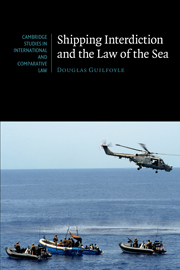Book contents
- Frontmatter
- Contents
- Foreword
- Preface
- Acknowledgements
- List of abbreviations
- Table of treaties and other international agreements
- Table of cases
- PART I General principles
- PART II Interdiction and maritime policing
- PART III The general law of interdiction
- 10 Interdiction: modalities and international law standards
- 11 National jurisdiction and immunities during interdictions
- 12 International responsibility and settlement of claims
- 13 General conclusions: a law of interdiction?
- Select bibliography
- Index
- CAMBRIDGE STUDIES IN INTERNATIONAL AND COMPARATIVE LAW
13 - General conclusions: a law of interdiction?
Published online by Cambridge University Press: 11 September 2009
- Frontmatter
- Contents
- Foreword
- Preface
- Acknowledgements
- List of abbreviations
- Table of treaties and other international agreements
- Table of cases
- PART I General principles
- PART II Interdiction and maritime policing
- PART III The general law of interdiction
- 10 Interdiction: modalities and international law standards
- 11 National jurisdiction and immunities during interdictions
- 12 International responsibility and settlement of claims
- 13 General conclusions: a law of interdiction?
- Select bibliography
- Index
- CAMBRIDGE STUDIES IN INTERNATIONAL AND COMPARATIVE LAW
Summary
This book has examined law enforcement at sea and in particular those situations where a state's public vessel, being a warship or vessel clearly marked as on government service, may take action either against vessels on the high seas not having the interdicting vessel's nationality or vessels located in the territorial waters of another state. The focus has been upon interdiction regimes where interdiction is understood to involve, first, the boarding, inspection and search of a ship at sea suspected of prohibited conduct (‘search’), and, second, where such suspicions prove justified, taking measures including any combination of arresting the vessel, arresting persons aboard or seizing cargo (‘seizure’). Analysis commenced from a consideration of basic principles of maritime jurisdiction, principally jurisdiction in the territorial sea and over vessels on the high seas.
A state's public vessels may interdict a non-national vessel on the high seas in one of three cases:
where the flag state consents;
where a permissive rule of general international law allows the interdiction; or
where the vessel is without nationality (i.e. stateless).
Where a boarding state seeks to effect an interdiction with flag-state consent, two initial issues arise: the determination of which state is the flag state (the question of how a vessel acquires nationality); and the authority enjoyed by the flag state over the vessel (the question of jurisdiction).
- Type
- Chapter
- Information
- Shipping Interdiction and the Law of the Sea , pp. 339 - 344Publisher: Cambridge University PressPrint publication year: 2009

